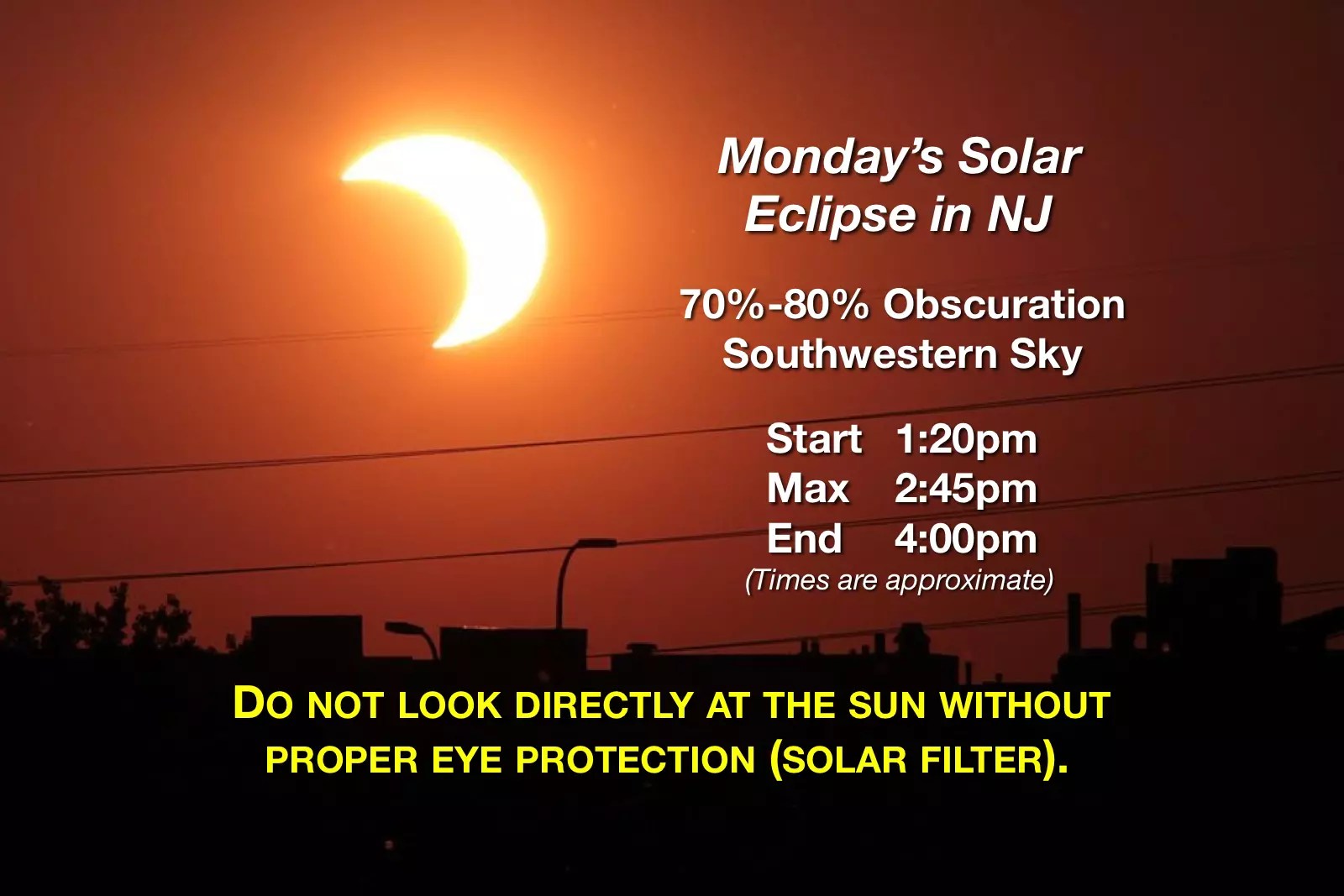The solar eclipse is an astronomical event that captivates people worldwide, and New Jersey is no exception. For residents of NJ, the upcoming eclipse will be a breathtaking sight not to be missed. Whether you are a seasoned eclipse chaser or a casual observer, understanding what to expect during this celestial event can enhance your experience. In this article, we will explore what the eclipse will look like in NJ, the science behind it, and how to prepare for the event.
This article aims to provide detailed insights into the upcoming eclipse in New Jersey, including the best viewing spots, safety tips, and historical context. We will also discuss various phases of the eclipse and how they will appear from different locations within the state. By the end of this article, you will have a clear understanding of what to expect and how to fully enjoy this spectacular event.
As the date approaches, it's essential to have the right information to ensure a safe and enjoyable viewing experience. With this comprehensive guide, you will be well-equipped to witness the beauty of the solar eclipse in NJ. Let’s dive into the details!
Table of Contents
- What is an Eclipse?
- Types of Eclipses
- Eclipse Schedule in NJ
- What to Expect During the Eclipse
- Best Viewing Locations in NJ
- Safety Tips for Viewing the Eclipse
- Historical Context of Eclipses
- Conclusion
What is an Eclipse?
An eclipse occurs when one celestial body moves into the shadow of another body. In the case of a solar eclipse, the moon passes between the Earth and the sun, blocking the sun's light partially or completely. This alignment creates a fascinating spectacle that can last from a few minutes to several hours, depending on the type of eclipse.
Types of Eclipses
There are three main types of solar eclipses:
- Total Eclipse: The moon completely covers the sun, resulting in total darkness during the day.
- Partial Eclipse: Only a portion of the sun is obscured by the moon, allowing some sunlight to reach Earth.
- Annular Eclipse: The moon is farther away from Earth, and its apparent size is smaller than the sun, creating a "ring of fire" effect.
Eclipse Schedule in NJ
New Jersey will experience a partial solar eclipse on [insert date]. The maximum coverage will occur around [insert time], and the entire event will last approximately [insert duration]. It’s crucial to check the specific times for your location, as they may vary slightly across the state.
Key Eclipse Times for NJ
- Start of Eclipse: [insert time]
- Maximum Eclipse: [insert time]
- End of Eclipse: [insert time]
What to Expect During the Eclipse
During the eclipse, observers can expect a gradual dimming of sunlight as the moon moves across the sun. The temperature may drop slightly, and birds may behave as if it is dusk. If you are lucky enough to experience a total eclipse, you will see the corona of the sun, a breathtaking sight that is often described as otherworldly.
Phases of the Eclipse
- First Contact: The moon begins to touch the sun.
- Second Contact: The partial eclipse begins.
- Maximum Eclipse: The greatest amount of the sun is covered.
- Third Contact: The partial eclipse ends.
- Fourth Contact: The moon completely moves away from the sun.
Best Viewing Locations in NJ
To enjoy the eclipse to the fullest, consider visiting one of the following locations known for their unobstructed views:
- High Point State Park: Offers high elevation and clear skies.
- Liberty State Park: A fantastic view of the horizon with the Statue of Liberty as a backdrop.
- Delaware Water Gap: Stunning scenery and ample space for viewing.
Safety Tips for Viewing the Eclipse
It's essential to protect your eyes while observing the eclipse. Here are some safety tips:
- Use solar eclipse glasses that meet the ISO 12312-2 international safety standard.
- Avoid looking directly at the sun without proper eye protection.
- Do not use regular sunglasses, CDs, or DVDs as substitutes for eclipse glasses.
Historical Context of Eclipses
Eclipses have fascinated humanity for centuries, often viewed with awe and fear. Ancient civilizations interpreted eclipses as omens or messages from the gods. Understanding the historical significance of eclipses can enhance your appreciation for this natural phenomenon.
For instance, the total solar eclipse of 1918 was a pivotal moment in American history, marking a time when the scientific community began to gain public interest and recognition. Eclipses have also played a crucial role in astronomical discoveries, including the bending of light around massive objects, which provided evidence for Einstein's theory of relativity.
Conclusion
In summary, the upcoming solar eclipse in New Jersey promises to be an unforgettable experience. By understanding what to expect, knowing the best viewing locations, and following safety guidelines, you can fully immerse yourself in this stunning celestial event. Don’t forget to gather your friends and family, and make a plan to enjoy the eclipse together!
We invite you to share your thoughts and experiences in the comments below. If you found this article helpful, consider sharing it with others who might be interested in the eclipse. For more exciting articles on astronomy and celestial events, be sure to explore our site!
Thank you for reading, and we hope to see you back here for more engaging content in the future!


